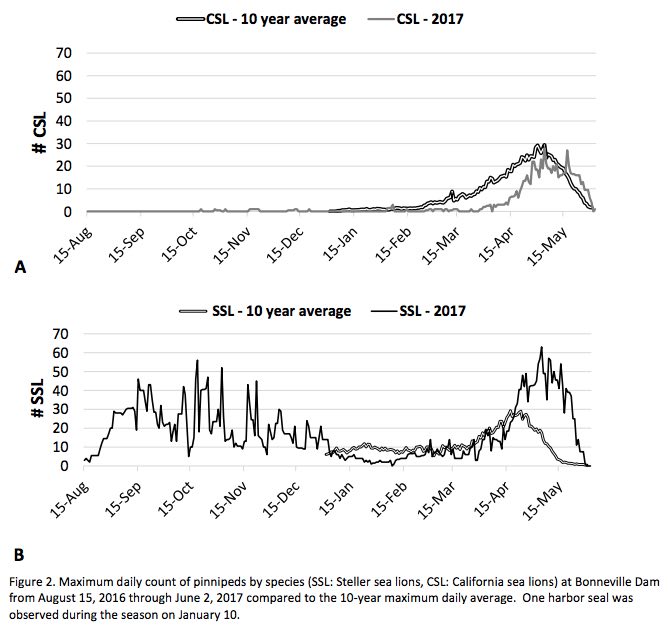forum
library
tutorial
contact

U.S. House Passes Herrera Beutler Bill
Authorizing Lethal Sea Lion Removal
by Zack Hale
The Daily News, June 27, 2018
|
the film forum library tutorial contact |

|
U.S. House Passes Herrera Beutler Bill
by Zack Hale
|
 Federally protected sea lions that feed on endangered salmon could be shot and killed under bipartisan legislation approved Tuesday by the U.S. House of Representatives.
Federally protected sea lions that feed on endangered salmon could be shot and killed under bipartisan legislation approved Tuesday by the U.S. House of Representatives.
The bill, co-sponsored by Southwest Washington Republican Jaime Herrera Beutler and Oregon Democrat Kurt Schrader, authorizes the "lethal removal" of California and Steller sea lions that prey on Chinook and steelhead salmon in the Columbia River.
Local fishermen and tribes have blamed rebounding sea lion populations for hastening the decline of wild Chinook salmon runs. Falling wild Chinook numbers have also threatened the region's endangered southern resident Orca whale population.
The 1972 Marine Mammal Protection Act already allows state agencies to kill up to 96 "individually identifiable" sea lions seen eating endangered salmon, but the bill championed by Herrera Beutler goes significantly further. The legislation authorizes state agencies and specific tribes to grant permits allowing hunters to kill up to 100 sea lions per year. Each permit holder would also be required to undergo training in natural resources management.
The total number of killings would be limited to 10 percent of the maximum number of sea lions that could be safely removed from the population.
The U.S. Secretary of the Interior could also suspend the issuance of permits after five years if the lethal removal of sea lions is deemed unnecessary to protect wild salmon runs.
A recent study by Oregon State University found that increasing predation from sea lions has eaten into the fishery harvest of adult Chinook salmon in the Pacific Northwest, including on the Columbia River.
The Washington Department of Fish and Wildlife estimates that sea lions consumed between 4.3 percent and 5.8 percent of the salmon and steelhead runs below Bonneville Dam over the last three years (see attached report).
"For the salmon and steelhead fighting to make it upstream, today's vote in the U.S. House of Representatives significantly improves their chances of survival," Herrera Beutler said in a press release. "We're not anti-sea lion. We're just for protecting a Pacific Northwest treasure: salmon, steelhead, sturgeon and other native fish species iconic to our region."
U.S. Sen Maria Cantwell, D-Wash., introduced an identical bill last week co-sponsored by Sen. James Risch, R-Idaho. The bill has been referred to the Senate Committee on Commerce, Science and Transportation, and it's unclear when it could get a vote.
Both bills are supported by the governors of Washington, Oregon and Idaho, as well as the Ilwaco Charter Association, Coalition of Coastal Fisheries, and public utilities.
But a biologist with the Animal Welfare Institute said Tuesday that killing more sea lions will not reverse the decline of wild salmon runs.
"The main problem is that this is not going to solve the problem," Naomi Rose, the institute's marine mammal biologist, said in an interview. "This is an example of lawmakers scapegoating these natural predators to satisfy the anger that constituent groups feel toward salmon decline."
Rose said wild salmon numbers have fallen mostly due to a loss of habitat and the construction of dams on the Columbia River.
Killing more sea lions could even make the problem worse, she said, because sea lions consume other species of fish that eat young salmon.
The decline of salmon, one of the region's iconic species, has been attributed to a host of factors: overfishing, habitat destruction, construction of the hydroelectric dams and predation by Caspian terns and cormorants. Sea lions historically have shared the salmon's ecosystem, but their numbers have rebounded while the fish runs are still far below their historic, pre-dam levels. So the mammals' impact on salmon runs is more pronounced, especially because manmade structures like fish ladders have made it easier for the sea lions to catch them.
Since gaining protected status, the number of California sea lions has increased from 5,900 to 47,000, and Steller sea lions increased from 74,400 to 78,500, according to state researchers.
U.S. Sen Patty Murray, D-Wash, said in a statement Tuesday that she is still reviewing the proposed legislation.
"It's critically important to our state -- from our economy, to our heritage, to the need to respect tribal treaty rights -- that we continue working to restore our iconic Pacific salmon runs," she said.
Related Pages:
Bill to Expedite Sea Lion Removal Clears House Natural Resources Committee by Staff, Columbia Basin Bulletin, 8/1/17
Congress Seeks to Weaken the Marine Mammal Protection Act by Maya L. Kapoor, High Country News, 7/28/17
House Natural Resources Committee Passes Bill to Expedite Sea Lion Removal by CBB Staff, Chinook Observer, 10/14/16
Predatory Sea Lions Are Detrimental to Columbia River Fish Runs by Gerry Lewis & Paul Ward, NW Fishletter, 5/1/17
Bill Would Streamline Process to Kill Sea Lions Near Bonneville Dam by Brian Brennan, KGW8, 4/4/18
learn more on topics covered in the film
see the video
read the script
learn the songs
discussion forum
